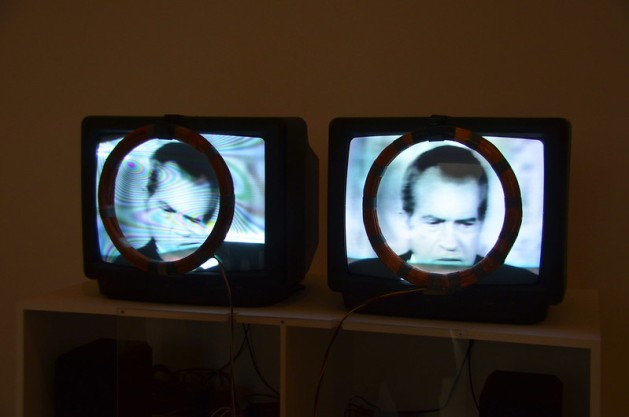
Photo (cc) 2018 by Adam Fagen
Previously published at GBH News.
The revelation last week that the Trump Justice Department had spied on three Washington Post reporters’ phone records barely caused a stir. But as much as I’d like to think that such behavior would shock the conscience, I can understand why the story failed to resonate. It was, after all, the sort of thing that all administrations do. To invoke a pandemic cliché, it was a sign that nature is healing.
Not to sound cynical and world-weary. We should be outraged. We should be shouting from the rooftops. When the government uses its awesome legal powers to stymie journalists who are trying to do their jobs, we lose our ability to hold the powerful to account. The incident would stand as yet another example of former President Donald Trump’s authoritarian tendencies — except that, at least in this instance, his actions were right in line with those of his predecessors.
As Jon Allsop of the Columbia Journalism Review wrote, “it’s not ‘bothsidesism’ to call out loathsome things that both sides are actually doing.”
So what happened? Devlin Barrett of the Post reported last Friday night that the Justice Department informed current Post journalists Ellen Nakashima and Greg Miller and former Post journalist Adam Entous that their phone records had been obtained, and their email logs had been unsuccessfully sought, for mid-April through July of 2017. The phone records showed whom the reporters were in contact with but did not reveal the contents of the calls.
There are a few details that make this particular exercise of executive power especially disturbing. The three reporters were delving into the 2016 Trump campaign’s ties to Russia during the period in question. The records were sought in 2020, when the attorney general was Trump enabler William Barr. Thus the incident could be seen as part of Trump’s long-standing obsession with covering up his ties to Russian interests.
In other respects, though, it was business as usual.
I wrote a commentary in 2012 for HuffPost headlined “Obama’s War on Journalism.” It’s a matter of public record that Barack Obama, during his eight-year presidency, showed a shocking lack of regard for the role of the press in a free society. Obama and his attorney general, Eric Holder, were obsessed with identifying government officials who had leaked sensitive or embarrassing information to the press. One reporter, James Risen of The New York Times, was threatened with jail for several years.
The Obama years were extreme but not exceptional. Previously, then-Times reporter Judith Miller actually did a stint behind bars for refusing to cooperate with an independent counsel’s investigation into possible wrongdoing by officials in George W. Bush’s administration: Someone had publicly identified a CIA operative in apparent retaliation for an op-ed (oops, guest essay) her husband had written for the Times that accused officials of ignoring evidence contradicting their claim that Iraq was trying to build nuclear weapons.
At least in that case, Bush had nothing to do with the investigation that landed Miller in jail. But Bush hardly had clean hands. After the Times reported that Bush’s National Security Agency was illegally spying on Americans, Bush denounced the paper’s work as “a shameful act,” and people around him urged that the Times be prosecuted under the World War I-era Espionage Act. The Times won a Pulitzer Prize for its revelations.
Of course, Richard Nixon’s attempts to retaliate against the press were legendary, ranging from including hostile reporters on his “enemies list” to threatening to strip The Washington Post of its television stations.
A central dilemma in all of these cases is that though the First Amendment offers robust protections for anything that the media might publish or broadcast, it is relatively silent on protections for reporting. In Branzburg v. Hayes, the 1972 decision that reporters do not have a constitutional right to protect their anonymous sources, Justice Byron White wrote that “news gathering is not without its First Amendment protections.” As a general rule, though, reporters have no more protections in going about their jobs than do ordinary members of the public.
Will the situation improve under President Biden? Not likely. As the CJR’s Allsop pointed out, the Biden Justice Department didn’t just inform the three Post journalists that they had been spied upon — it went out of its way to endorse the practice. Marc Raimondi, a spokesman for the current Justice Department, was quoted in the Post’s account as saying that the department “follows the established procedures within its media guidelines policy when seeking legal process to obtain telephone toll records and non-content email records from media members as part of a criminal investigation into unauthorized disclosure of classified information.”
Raimondi added — shades of Obama and Holder — that “the targets of these investigations are not the news media recipients but rather those with access to the national defense information who provided it to the media and thus failed to protect it as lawfully required.”
With public approval for the media near record lows, and with the courts unlikely to carve out any new protections for journalism, it’s not realistic to think that things are going to change for the better any time soon.
At the very least, though, the president could issue guidance to his Justice Department, backed up with a strong public statement, that the government will not spy on, subpoena or prosecute journalists except under the most dire life-and-death circumstances.
Biden appears to be intent on breaking with his predecessors in many ways, especially regarding the size and scope of government. Respecting the role of the press would be one way that he could ensure greater scrutiny of that government on behalf of all of us.




